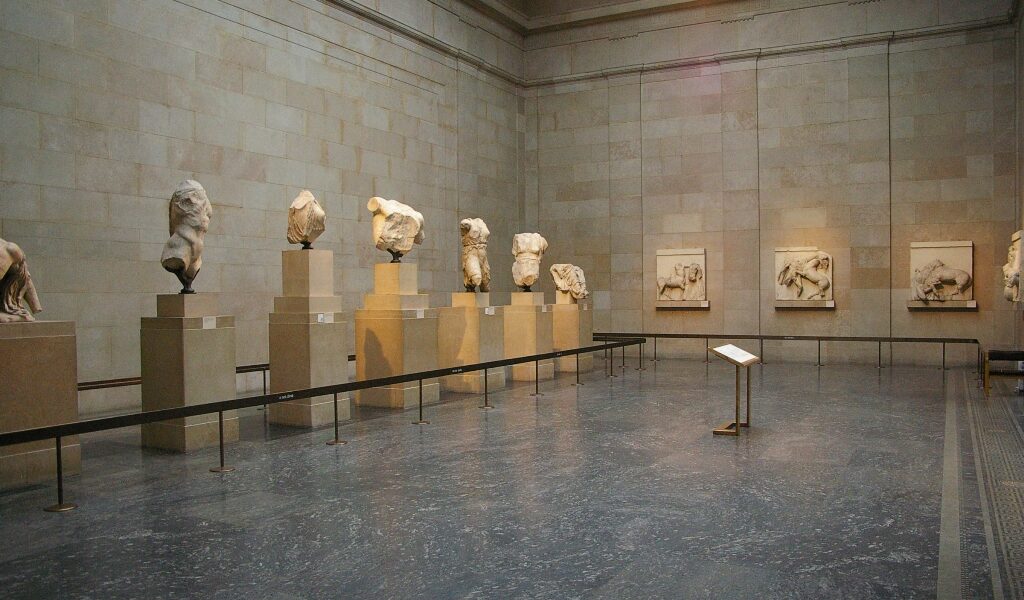Reports are emerging from London about secret negotiations between George Osborne, the Chair of Trustees of the British Museum, and the Greek Prime Minister, Kyriakos Mitsotakis, and other senior ministers over the fate of the Elgin collection of Parthenon sculptures currently held on display in the museum’s controversial Duveen Gallery.
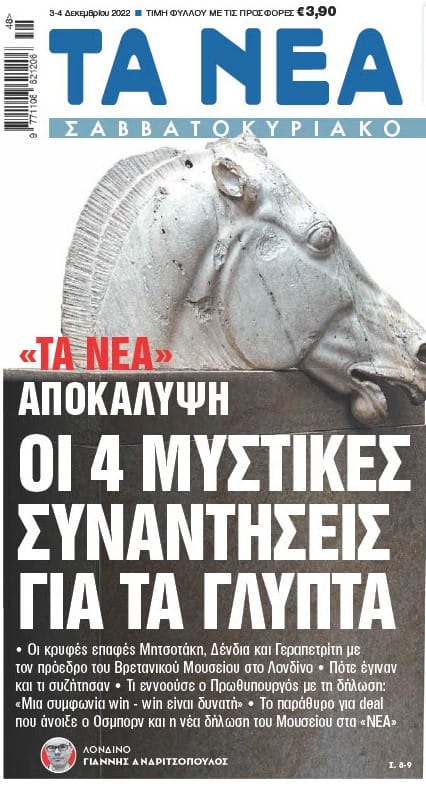
According to the highly reputable and well-placed London correspondent for the Greek newspaper Ta Nea, Yannis Andritsopoulos secret talks have been underway for just over a year to find a solution to this seemingly intractable problem.
According to informed sources mentioned by the Ta Nea correspondent, for the last thirteen months – following Mitsotakis’ much-publicised meeting with his then UK counterpart, Boris Johnson - the Greek government has held a series of meetings with Osborne to work towards a mutually acceptable settlement to a problem that has been lingering since 1816 when the UK Parliament voted to purchase the sculptures by Elgin and then by an act of parliament vested the imperiously-named Elgin Marbles in the British Museum.
Prime Minister Kyriakos Mitsotakis himself hinted at progress in an interview he gave earlier this week in London on the occasion of the 25th anniversary of the establishment of the Hellenic Observatory of the London School of Economics.
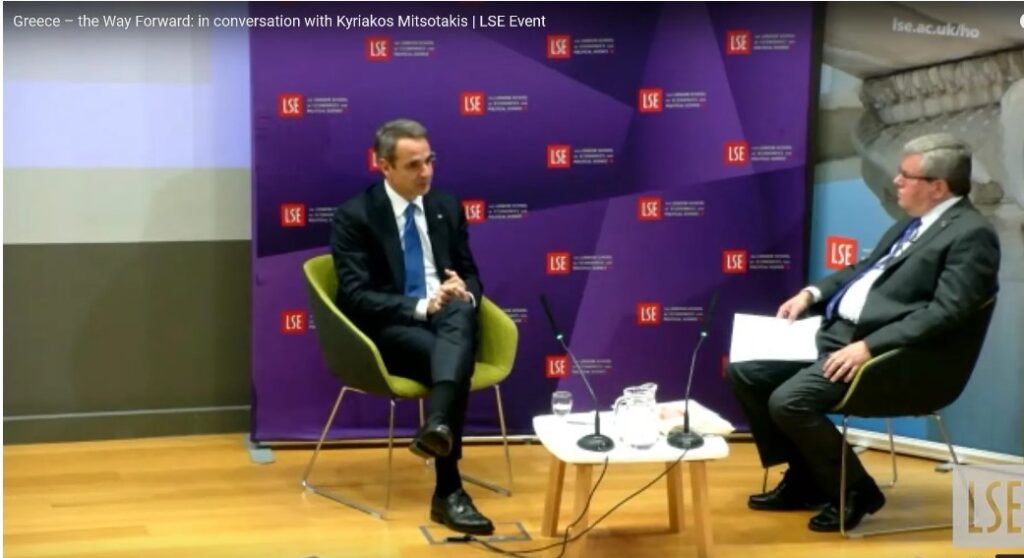
Speaking with the School’s Director, Kevin Featherstone, the Greek Prime Minister confirmed that the question of the reunification of the Parthenon sculptures is very close to his heart and is a cause “that all Greeks would very much like the government to work towards achieving”.
Mitsotakis added:
“We’ve seen progress. I don’t want to speak publicly about the discussions that we have had. But I think there is a better sense of understanding that maybe a win-win solution can be found that will result in a reunification of the Parthenon sculptures in Greece, while at the same time also taking into consideration concerns that the British Museum may have. So I don’t want to say anything more in public about this at present, but again, I do sense the momentum.”
As the Greek correspondent for Ta Nea reports, the theatre of operations for the political and diplomatic 'war of the marbles' has effectively moved to London. And George Osborne is now painted, not as a warrior fighting against the Greeks, but as their interlocutor, with the ultimate aim of finding a mutually beneficial solution.
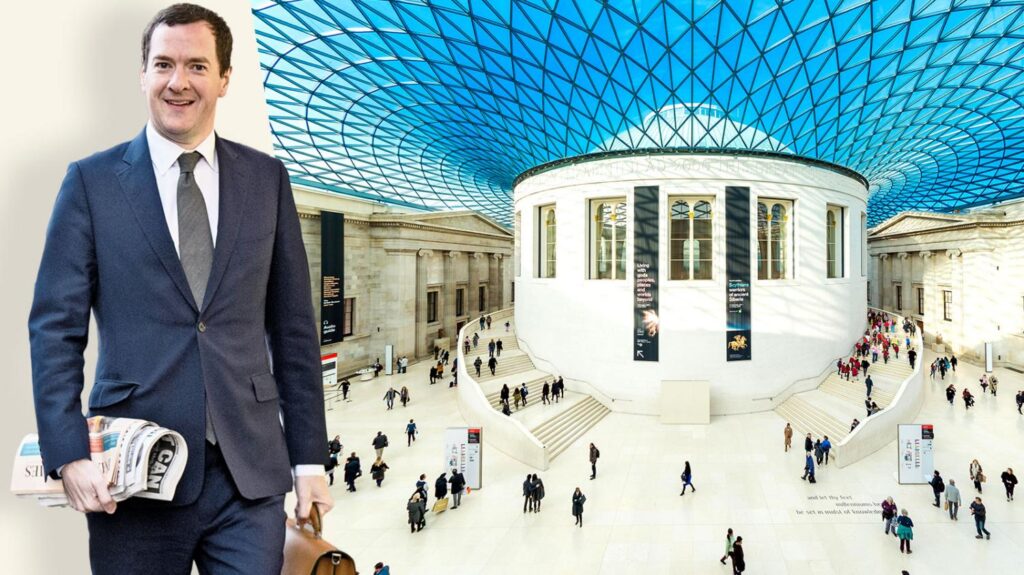
The first meeting between Osborne and Mitsotakis took place when the Greek PM went to London in October 2021 and although described as exploratory in nature, the meeting was reported to have gone “very well". This was followed by meetings between the Greek Secretary of State (and close Mitsotakis confidante), Giorgos Gerapetritis, and Osborne in London in 2021 and 2022, both in person and remotely.
In early October this year Osborne also met the Greek Foreign Minister, Nikos Dendias, at the residence of the Greek Ambassador’s residence in Mayfair, London.

The most recent round of negotiations at the highest level took place on 28 November, shortly before Kyriakos Mitsostakis was received by King Charles III at Windsor Castle, when the Greek Prime Minister again met Osborne. It is reported that the discussions were constructive but, according to Yannis Andritsopoulos' sources, both sides acknowledge that whist they have come along way there is still unfinished business:
"We agree on a lot, but there are also points of disagreement. An agreement is 90 per cent complete, but a critical 10 percent remains unresolved. It's hard to get there, but it’s not impossible."
The most likely scenario for a resolution is the idea of a 'long-term cultural cooperation' between the British Museum and Greece which, on the one hand, will allow the reunification of the Sculptures in the Acropolis Museum and, on the other hand, enable the British Museum to stage temporary rotating exhibitions featuring rare ancient Greek artefacts that will be guaranteed draw cards. As always with delicate negotiations, the devil will be in the details.
The British Museum - which is the self-proclaimed "museum of and for the world"- is on record as stating that it wants to create new ways and opportunities for collections to be shared and understood around the world and for creating connections between the present and the past. In a recent address to the Trustees Osborne went further, declaring that it can become the Museum “of our common humanity” but that there are "long-term partnerships to be struck" although he also warned that dismantling the museum's collection "must not become the careless act of a single generation”.
So what do we make of these developments?
George Osborne has previously declared that there is "a deal to be done" as the international campaign for restitution of looted cultural artefacts gains momentum and, in particular, the reunification of the fragmented sculptures from the Parthenon
And of course it remains to be seen how the UK and Greece will deal with the thorny issue of ownership of the sculptures given the legal impasse perpetuated by the provisions of the British Museum Act which effectively prevents the museum from deaccessioning any items in its collection and the historic refusal of successive British governments to amend the legislation to give the trustees discretionary powers.

That is where the recent precedent set by the return of the so-called Fagan fragment from Palermo in Sicily may provide a clue. The piece, which was arguably the first of the Elgin Marbles to be returned (as it is strongly suspected that Lord Elgin had gifted the piece to his fellow consul, Robert Fagan, whilst en route to England) has been placed in the Acropolis Museum by way of a deposit sine die. Or, to borrow from the title of one of the iconic movies of the great Greek cinematographer, Theo Angelopoulos, for Eternity and a Day.
As Andritsopoulos reports, an unnamed source suggested that there are several solutions being considered that could ‘set aside’ the ownership issue in a possible deal and that there are ways to avoid mentioning ownership in an agreement on the sculptures' return.
Greece has also shown its cultural diplomatic and soft power adeptness in recent meetings of the influential UNESCO Intergovernmental Committee dealing with illicit cultural property, highlighted by a landmark decision of the UNESCO committee in September 2021 to admonish the British side for lack of progress in negotiations and its failure to acknowledge Greece’s legitimate interests in reclaiming the ancient keys to its history.
The Greek Government in recent times, under the stewardship of the Culture Minister, Dr Lina Mendoni, has also negotiated a tripartite agreement with the American billionaire, Leonard Stern, and the Metropolitan Museum of Art in New York over the gradual and staged return of 161 Cycladic idols and other bronze age artefacts to Greece. Although the deal remains controversial because of the dubious provenance of many of the pieces in the Stern collection, it was nonetheless touted as a possible template for the restoration of the Parthenon Sculptures to the Acropolis Museum.
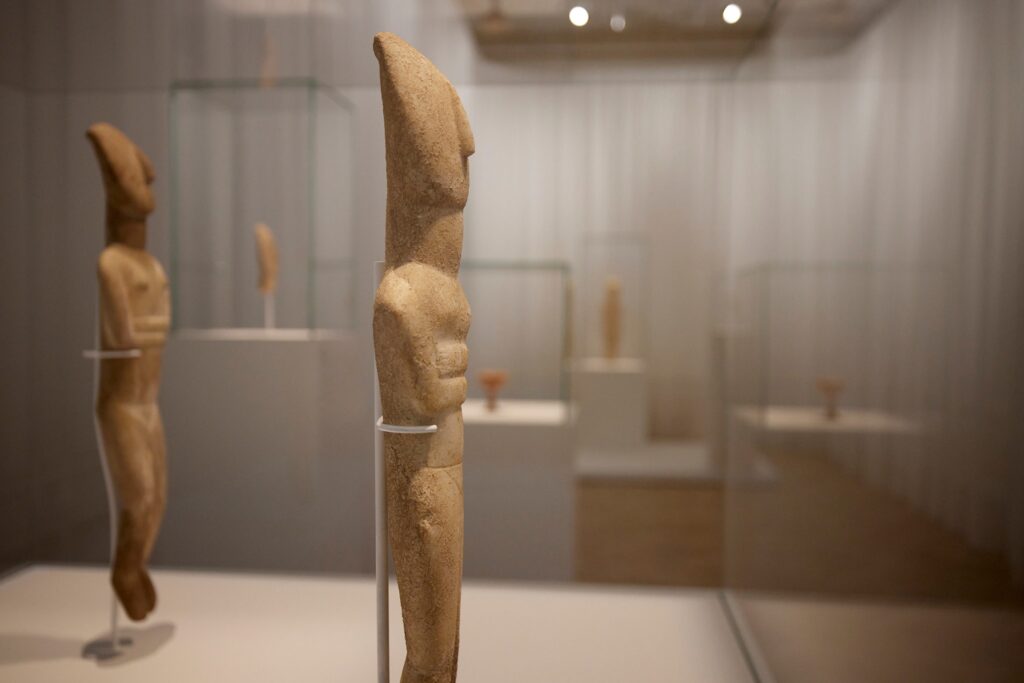
But recent developments in London have also been pivotal.
In October this year, Lord Vaizey, a former Conservative Minister of the Arts (and, ironically, the Minister who signed the UK government’s letter back in 2015 rejecting the UNESCO request for mediation of the dispute) was appointed chair of the advisory board of the Parthenon Project, an organisation created under the aegis of the Greek-American industrialist, John Lefas, and which is lobbying for a new cultural compact between the UK and Greece with a view to achieving a “win win” solution in respect of the Parthenon Sculptures. It has gained considerable prominence with other board members including the former Labour Culture Secretary Ben Bradshaw, actor and writer Stephen Fry, journalist Sarah Baxter and Conservative peers Baroness Meyer and Lord Dobbs.
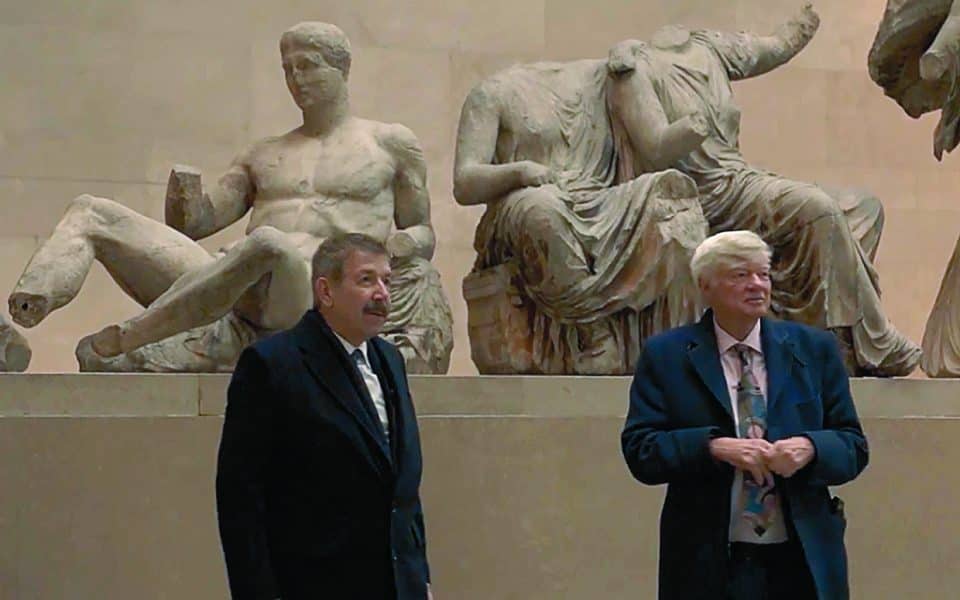
The involvement of the Greek Embassy in London is also significant. Roger Michel of the Institute of Digital Archaeology recently unveiled an exact robot-perfected replica of the sculpture of the horse of Selene from the Elgin collection. Michel has publicly thanked the Greek Ambassador, Ioannis Raptakis, for his unflinching support and is also confident that there is a deal to be done with the British.

Yannis Andritsopoulos has since written on twitter that a spokesperson for the British Museum has confirmed that the museum has publicly called for a new Parthenon Partnership with Greece and is prepared to talk to all the relevant parties, including the Greek Government, about how to take that forward. However, the spokesperson added (echoing the words of Osborne):
"We operate within the law and we’re not going to dismantle our great collection as it tells a unique story of our common humanity. But we are seeking new positive, long-term partnerships with countries and communities around the world and that of course includes Greece."
It remains to be seen whether we are on the cusp of an enlightened cultural partnership between Greece and the UK. The initial signs are promising but there is still a lot more work to be done.
George Vardas is the Arts & Culture Editor as well as Co-Vice President of the Australian Parthenon Association which has played a prominent role in the international campaign for reunification

